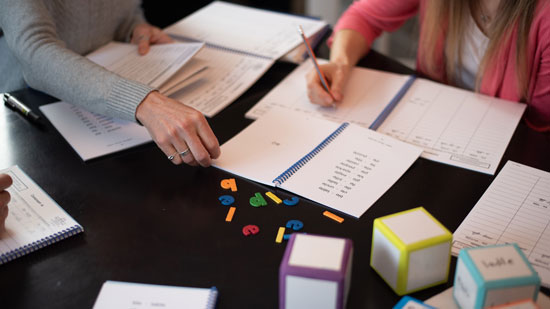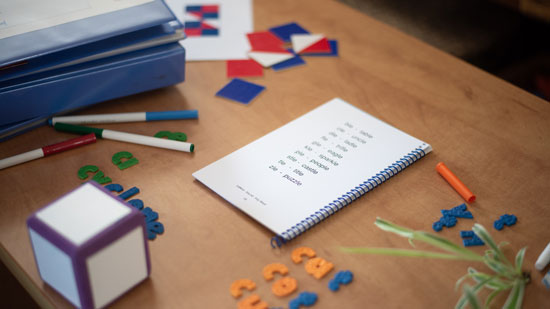NILD Courses
NILD Educational Therapy Courses
Our core training, NILD Educational Therapy®, is targeted to the educator with a bachelor’s degree, preferably in education or a related field. The three master levels of training lead towards professional certification in educational therapy. We believe that these three levels have immense value not only in teaching specific techniques, but also in providing an understanding of all the cognitive functions involved in the learning process.
Each level of training builds upon the previous level and includes four weeks of online course work plus one week of residency.

NILD U.S. courses are offered for credit towards a Master’s Degree in Education with a focus in Educational Therapy at two U.S. universities, Regent University and Southeastern University.
Upon successful completion of NILD Level III training, the educational therapist is granted PCET (Professionally Certified Educational Therapist) status which is renewed annually.
Join one of our FREE Information Sessions, read our FAQ page, and then check out our Events page to view all upcoming courses and to apply.
Course Levels
NILD Educational Therapy Level I
Level I provides the foundation for offering educational therapy, training participants to identify and assess student learning needs, to create and implement individual educational therapy techniques specific to the learning goals for each student.
NILD Educational Therapy Level II
Level II introduces new techniques and addresses the development of oral language through the process of mediation and effective questioning in order to promote higher order thinking skills.
NILD Educational Therapy Level III
Level III develops mastery skills and provides an in-depth study of mediation, cognitive functions and information processing within NILD Educational Therapy® techniques. Upon completion of all three levels, you are awarded Professional Certification. To remain active as a Professionally Certified Educational Therapist (PCET), you are required to re-certify yearly.
Group Educational Therapy (GET)
NILD Educational Therapy® GET, is an effective way to harness the dynamics of one-on-one and multiply the effectiveness through group intervention. NILD educational therapists are taught how to adapt and implement the five core techniques in small group work for four to six students per group.
Would you like to learn more about training as an NILD Educational Therapist?
Join our next FREE Information Session where you can learn the distinctives of NILD Educational Therapy® and the steps towards certification as an NILD Educational Therapist.
NILD Educational Therapist Testimonials
NILD Educational Therapy Level I
TEACHING HOW TO LEARN: Developing Cognitive Competencies
This course serves to develop a foundational methodology for training students how to learn by strengthening current cognitive systems to greater efficiency. The result for students in the National Institute for Learning Development Canada (NILD) Educational Therapy is significantly higher cognitive, academic, perceptual, and emotional functioning.
Candidates will explore the usage of psychological and educational assessment, discovering real patterns of cognitive strengths and weakness. Candidates will gain a comprehensive understanding and utilization of the NILD Level I techniques. This course combines four weeks of online course work with one week of classroom instruction.
Course Pre-Requisites:
- Preferred Bachelor’s degree, preferably in education or related field (other degrees/certificates in
related fields will be considered).


During residency week, you will practice and demonstrate the techniques learned. Our lecture and laboratory course is designed to train all educators to administer the five core techniques of educational therapy to students with learning difficulties. Three broad topics are addressed in this introductory course:
1) Philosophy – The definition of learning difficulties, program distinctives and methods of intervention in accordance with the model developed by NILD.
2) Assessment – Pupil evaluation by means of informal teacher assessment and formal psychological and educational assessment
3) Intervention – Individualized implementation of techniques for stimulation of processing and cognitive weaknesses.
Level I Course Learning Outcomes
This course will equip the beginning educational therapist with the tools used to identify and assess students’ learning needs and prepare the beginning educational therapist to create and implement individual educational therapy plans utilizing the NILD techniques specific to the educational goals for individual students.
- Demonstrate fundamental understanding of NILD’s philosophy and methodology
- Describe NILD’s comprehensive approach of intervention that develops learning through perception, academics, cognition, and emotions.
- Identify the differences between NILD methodology and tutoring.
- Evaluate how improving cognitive functioning can impact reading, math and spelling.
- Analyze learning challenges to efficiently apply specific tools to develop and enhance thinking skills.
- Identify the components for an effective intervention program based on the NILD Educational Therapy techniques.
- Determine future intervention based on cognitive, academic, perceptual, and emotional functioning data.
- Outline the importance of literacy skills in the areas of phonemic awareness, phonics and syllabication for reading acquisition.
NILD Educational Therapy Level II
TEACHING HOW TO LEARN: Developing Cognitive Competencies
This course serves to develop a foundational methodology for training students how to learn by strengthening current cognitive systems to greater efficiency. The result for students in NILD Educational Therapy is significantly higher cognitive, academic, perceptual, and emotional functioning.
This course will build upon prior knowledge and equip the Educational Therapist to more effectively implement NILD techniques.
Course Pre-Requisites:
- Completion of NILD Educational Therapy Level I
- 80 student contact hours
- Demonstration of a therapy session


Level II Course Learning Outcomes
-
Explain the impact of student learning based on the five core NILD techniques.
-
Demonstrate proficiency in the initial level of techniques for specific student intervention.
-
Use Level II techniques to impact processing deficits more effectively.
-
Apply ethical standards and codes of conduct in the practice of NILD Educational Therapy.
-
Describe the characteristics of a learning disability.
-
Determine patterns of cognitive/academic strengths and weaknesses through data analysis from formal assessments.
-
Implement language development and critical thinking in developing skills of reading, math, and spelling.
-
Explain the reciprocal relationship among educational therapists, classroom teachers, parents, and NILD.
-
Outline how questioning, pacing, transitions, and bridging to life impacts students.
-
Demonstrate mediated learning, in conjunction with NILD Educational Therapy, to ameliorate processing deficits.
NILD Educational Therapy Level III
TEACHING HOW TO LEARN: Developing Cognitive Competencies
This final course towards professional certification will help participants expand their ability to incorporate cognitive function development within NILD Educational Therapy techniques, effectively implement mediated learning experiences and developing language competencies in students. This course will help you refine your therapy techniques even further and learn some additional techniques to add to your toolbox.
Course Pre-Requisites:
- Completion of NILD Educational Therapy Level I & II
- 160 student contact hours


Level III Course Learning Outcomes
- Evaluate the five core techniques according to the tenets of Cognitive Functions.
- Demonstrate competency in the NILD Educational Therapy techniques while providing student-specific intervention for learning deficits.
- Implement language competencies for student development of reading comprehension and written expression.
- Incorporate cognitive function in conjunction with NILD Educational Therapy techniques.
- Determine student cognitive functions and dysfunctions through diagnostic and prescriptive competency data.
- Refine questioning skills to stimulate oral language.
- Scaffold the skills of pacing, transition, and application of mediated learning to build competence and confidence for student learning.
- Articulate the theoretical constructs that underlie NILD Educational Therapy.
Group Educational Therapy (GET)
NILD’s Group Educational Therapy is an effective way to harness the dynamics of one-on-one and multiply the effectiveness through group intervention.
NILD Educational Therapists are taught how to adapt and implement the five core techniques of NILD Educational Therapy in small group settings of four to six students per group.
Developing peer mediation enhances students’ self-regulation skills, facilitates social learning and cooperation abilities, and promotes interactive language among peers.
Course Pre-Requisites:
- Completion of NILD Educational Therapy Level II


Imagine the power of NILD Educational Therapy in a small group setting! You will see your students’ confidence and competence soar.
NILD Educational Therapist License
Upon successful completion of NILD Educational Therapy Levels I, II, or III, therapists sign a licensure agreement that automatically gives them a one-year license to practice NILD Educational Therapy.
Being licensed ensures the educational therapist is compliant with NILD’s policies and is permitted to practice and purchase educational therapy materials as well as access all the exciting Licensee Benefits available to all current licensees.
Licensure expires September 30th of the year following course completion. October 1st is the annual deadline for submitting license renewal for the upcoming year.
We want you to have the tools you need to make a difference in the lives of your students. We want you to be a part of our team.
We are here to support you!
Ready to apply?
We’re available to walk you through each step of the application process.
